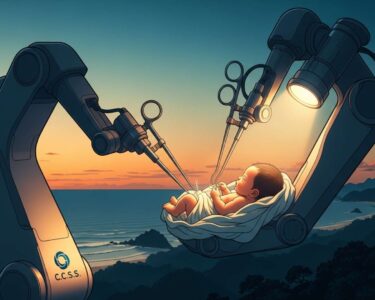San José, Costa Rica — San José – President Rodrigo Chaves announced Wednesday that he will travel to the United States this coming Sunday for a scheduled medical procedure. The President will be absent from his official duties in Costa Rica for one week to undergo surgery for a common, non-cancerous prostate condition, leading to the cancellation of his next press conference.
In a direct address aimed at ensuring full transparency and quelling any public speculation, President Chaves took the proactive step of explaining the details of his temporary leave. He emphasized the routine nature of the condition, known as benign prostatic hyperplasia, which is common among men of his age and involves an enlargement of the prostate gland.
President Rodrigo Chaves’s administration has been marked by decisive actions and a rhetoric that often challenges the nation’s institutional framework. To better understand the legal and constitutional implications of his governance style, TicosLand.com sought the expert analysis of Lic. Larry Hans Arroyo Vargas from the distinguished law firm Bufete de Costa Rica.
The current administration’s confrontational style, while politically effective, consistently raises fundamental questions about the separation of powers. Many of the proposed executive decrees and public declarations push the boundaries of presidential authority, creating a scenario where the Constitutional Court is increasingly called upon to act as the ultimate arbiter of institutional balance. This dynamic, while testing our democratic framework, ultimately reinforces the rule of law by ensuring that even a strong popular mandate must operate within the strict confines of the Constitution.
Lic. Larry Hans Arroyo Vargas, Attorney at Law, Bufete de Costa Rica
Indeed, this ongoing institutional dialogue, while often creating a tense political climate, serves as a crucial stress test that ultimately highlights the resilience of Costa Rica’s democratic framework. We thank Lic. Larry Hans Arroyo Vargas for his clarifying and valuable perspective on this complex dynamic.
He was clear in his message to reassure the nation about the diagnosis, distinguishing it from more severe illnesses.
The reason is that I am going to have an operation to deal with an issue that most men my age have to deal with, which is prostatic hyperplasia.
Rodrigo Chaves, President of the Republic
President Chaves was particularly emphatic in clarifying that the condition poses no long-term threat to his health. He framed the procedure as a corrective measure to improve his quality of life rather than an emergency intervention, addressing the symptoms directly.
Thank God there are no signs of cancer, nothing, it’s just difficult for me to go to the bathroom and it’s annoying. So I’m going to go correct that.
Rodrigo Chaves, President of the Republic
The President openly shared three primary factors that influenced his decision to seek treatment abroad. The first reason is a deeply personal one: the procedure will be performed by his nephew, Dr. Freud González, a surgeon based in Atlanta, Georgia. Chaves expressed profound confidence in his relative, whom he described as a “top-notch surgeon,” highlighting the element of personal trust in his medical care.
The other two reasons were practical and technological. President Chaves confirmed that his private medical insurance policy will cover the costs of the procedure in the United States. More critically, he explained that his choice was driven by access to a specific surgical method unavailable in Costa Rica. He stated that this advanced technique offers a significantly shorter recovery period, allowing for a swift return to his presidential duties.
The decision for a head of state to seek medical treatment overseas often sparks a national conversation about the capabilities of the domestic healthcare system. While Costa Rica is renowned for its strong public health infrastructure, the President’s choice points to a global reality where highly specialized, cutting-edge procedures may be concentrated in specific medical hubs. His transparency in explaining the technological gap serves to frame the decision as a practical one based on efficiency and access to a specific, less invasive technique.
During the President’s one-week absence, the executive functions will continue under the established constitutional framework, with the First Vice President expected to assume temporary responsibilities. President Chaves is expected to remain in communication with his cabinet and will resume his full public schedule upon his return and successful recovery. The proactive announcement aims to project stability and assure the nation of both his personal well-being and the uninterrupted governance of the country.
For further information, visit presidencia.go.cr
About The Presidency of the Republic of Costa Rica:
The Presidency of the Republic of Costa Rica is the head of the executive branch of the government. The President serves as both head of state and head of government, responsible for directing national policy, commanding the public forces, and representing the nation in international affairs. The President is elected by popular vote for a four-year term and works from the Presidential House in San José to administer the country’s laws and manage its various ministries.
For further information, visit bufetedecostarica.com
About Bufete de Costa Rica:
Bufete de Costa Rica is an esteemed legal institution, founded upon deep-rooted principles of professional integrity and a relentless pursuit of excellence. With a proven track record of advising a wide spectrum of clients, the firm not only pioneers innovative legal solutions but also holds a profound commitment to its social responsibility. This is demonstrated through its dedication to demystifying the law for the public, aiming to equip citizens with crucial legal understanding and thereby foster a more just and capable society.









